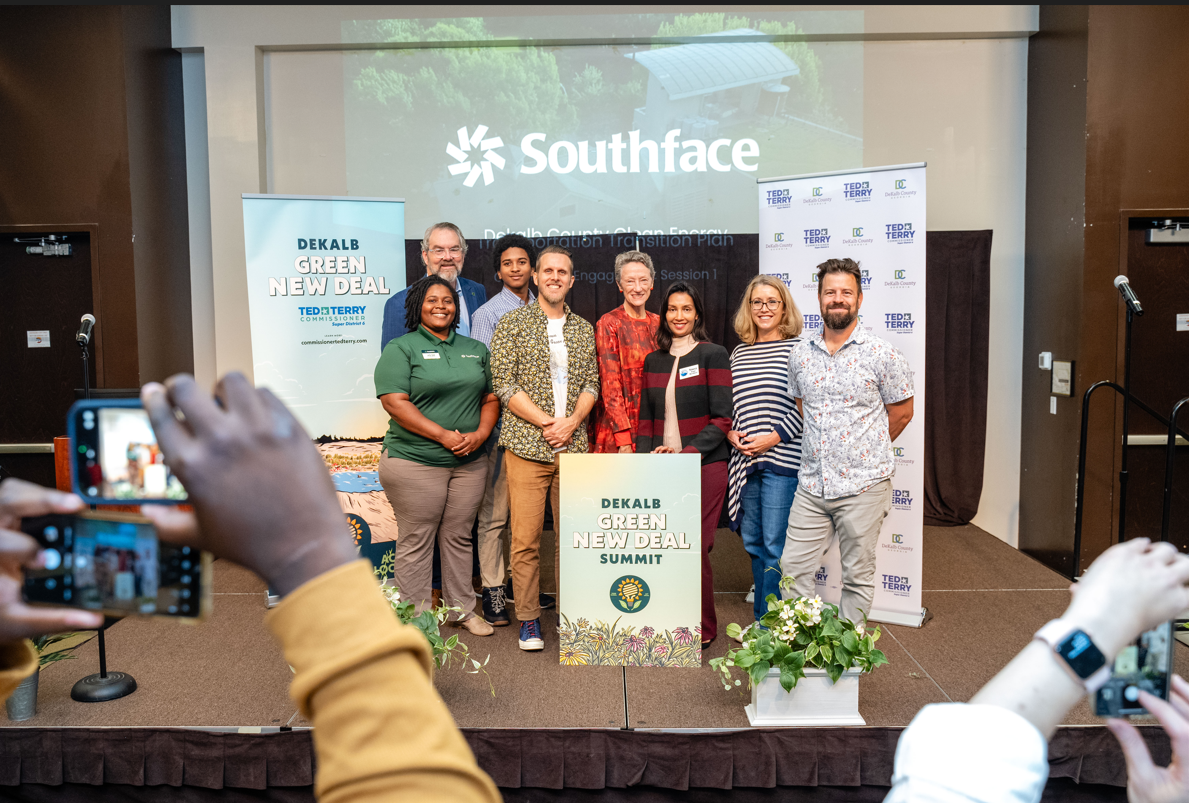From Decaturish.com
Published: October 16, 2023
By: Anila Yoganathan, contributor
DeKalb County, GA — In an effort to generate support for environmental policies to redesign DeKalb County, commissioner Ted Terry hosted more than 100 residents at the Green New Deal Summit on Saturday.
The all-day conference included discussions on how to conserve energy and save on electric bills at home and presented ideas on how to make the county more accessible by foot or bike, less dependent on cars, and how to protect the trees, especially during new development.
“Some of these things are kind of radical, like building tiny homes and preserving 50% of land for non-development. Like that’s kind of controversial,” Terry told Decaturish. “You need people who support that concept, they have to say that they support it because that’s how politics works.”
Each presentation highlighted current initiatives for the county, with the goal of getting residents to come and support these initiatives at the county commission.
The sessions included groups that are already working with the county on sustainability efforts, such as the Southface Institute, which spoke with residents on common myths on how to save on their electric bills or upgrade their homes to be more energy efficient.
For example, if residents are interested in solar panels, they should consider making other changes to reduce their bills first and join a solarize campaign to crowdsource funding for buying panels in bulk rather than invest on their own, Southface Project Manager Jo’de Cummings said.
This is the Southface Institute’s first of five sessions for community engagement, and future sessions will continue to build knowledge, Terry said.
Presentations were also given by researchers and organizations that are promoting alternative methods of how to develop land in the county.
“I hope that I’ve convinced you we do not need to tear down a single tree,” said Ellen Dunham-Jones, director for Masters of Science in Urban Design at Georgia Tech, at the end of her presentation.
Dunham-Jones presented proposals by her students on different areas in the county that could be redeveloped with a more sustainable lens. This included proposals from students going back to 2021 about how to redevelop North Dekalb Mall, the Gallery at South Dekalb, Memorial Drive, and Scottdale. The students spoke with property owners and community members to help inform their proposals. They also analyzed historic maps that helped inform environmental conditions.
Some of these proposals are current areas that have been discussed for redevelopment in Dekalb, such as the DeKalb Farmers Market, which Dunham-Jones said plans to increase its operations and parking lot by about fivefold, and its plans are already approved.
“We love the farmers market. We absolutely want to be supportive. It is a fantastic asset to our community,” Dunham-Jones said. “But instead of having a massive urban heat island producing a lot of polluting runoff, this team [of students] proposed that instead the parking for the store [be put] in a parking garage attached to the new store.”
The land that would have been used for the parking lot could then be used to make a car-free neighborhood, Dunham-Jones said. The goal of more walkable areas includes increased accessibility for people who do not have a car or cannot drive, reduced traffic and reduced air pollution.
“Developers have had their run of DeKalb County for 60-plus years,” Terry said. “We can’t go back in time. So the best approach is to do two things: to conserve what we have and to make better use of what we’ve already done.”
The presentations were not only meant to educate residents on different ways of thinking about development in the county, but also how each of these issues is impacted by the county government’s planning and zoning decisions.
“Because we grew up in the 50s and the 60s, we have lots of roads connecting low-density neighborhoods, right? What does that mean? It means we have potholes everywhere. Why? We can’t afford to maintain our roads,” Walter Brown, who presented information on trails, said. “So what are we doing with our SPLOST, a huge chunk of it … goes to repaving. Wouldn’t you like to see that money reprogrammed to sustainable transportation alternatives?”
Brown presented information about the county’s research into multi-use trails, which also comes as two trail expansion projects are being looked at in Commissioner Michelle Long Spears’ district two: the Emory trail expansion and the Peachtree Creek Greenway. The presentation included discussing the benefits to health, job creation, and environmental benefits.
The final presentation pulled some of the prior discussions together by looking at village conservation communities where trees are preserved and land is used effectively. Greg Ramsey, founder of Village Habitat Design, said there is limited undeveloped land in DeKalb County.
The program looks at undeveloped parcels clustered together or near one another and creates designs based on the parcels where development should go, where trails can be implemented, and where walkability and community infrastructure can be put. The approach prioritizes nature, urban agriculture, and development.
“We need walkable villages and hamlets to bring local workplaces back so that it’s not an absentee neighborhood. Instead, it’s an active neighborhood,” Ramsey said.



